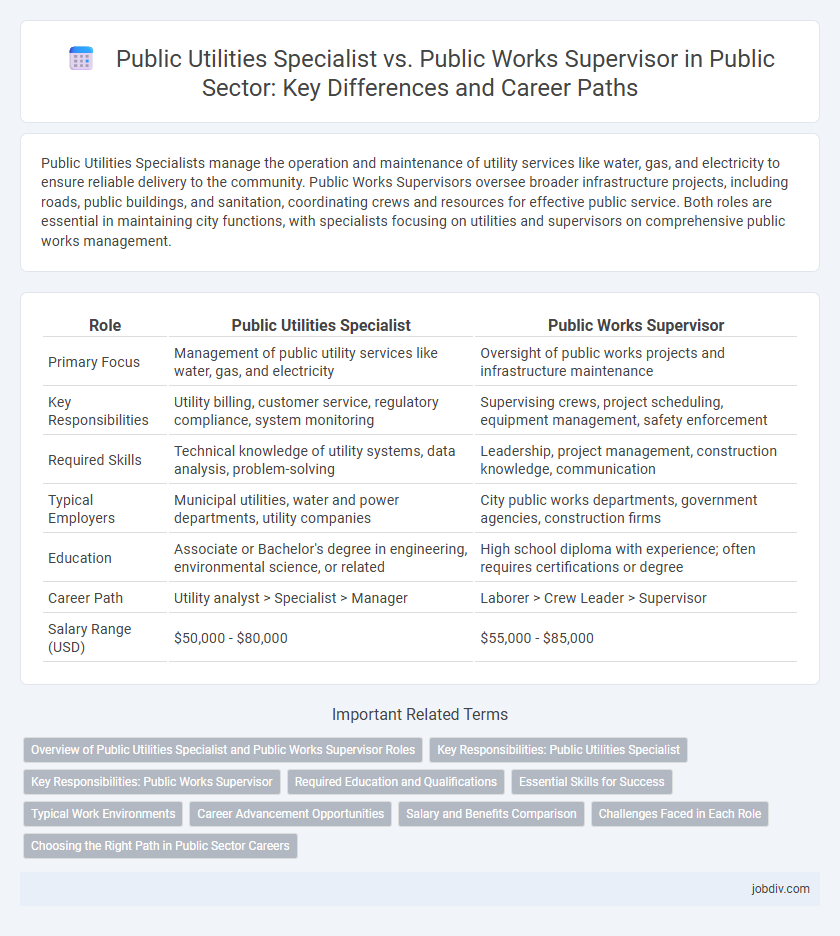Public Utilities Specialists manage the operation and maintenance of utility services like water, gas, and electricity to ensure reliable delivery to the community. Public Works Supervisors oversee broader infrastructure projects, including roads, public buildings, and sanitation, coordinating crews and resources for effective public service. Both roles are essential in maintaining city functions, with specialists focusing on utilities and supervisors on comprehensive public works management.
Table of Comparison
| Role | Public Utilities Specialist | Public Works Supervisor |
|---|---|---|
| Primary Focus | Management of public utility services like water, gas, and electricity | Oversight of public works projects and infrastructure maintenance |
| Key Responsibilities | Utility billing, customer service, regulatory compliance, system monitoring | Supervising crews, project scheduling, equipment management, safety enforcement |
| Required Skills | Technical knowledge of utility systems, data analysis, problem-solving | Leadership, project management, construction knowledge, communication |
| Typical Employers | Municipal utilities, water and power departments, utility companies | City public works departments, government agencies, construction firms |
| Education | Associate or Bachelor's degree in engineering, environmental science, or related | High school diploma with experience; often requires certifications or degree |
| Career Path | Utility analyst > Specialist > Manager | Laborer > Crew Leader > Supervisor |
| Salary Range (USD) | $50,000 - $80,000 | $55,000 - $85,000 |
Overview of Public Utilities Specialist and Public Works Supervisor Roles
Public Utilities Specialists manage and maintain essential services such as water, gas, and electricity, ensuring system efficiency and regulatory compliance. Public Works Supervisors coordinate construction, maintenance, and repair projects for public infrastructure, including roads, bridges, and drainage systems, overseeing crews and resources. Both roles require technical expertise and leadership skills but focus on different aspects of public infrastructure operations.
Key Responsibilities: Public Utilities Specialist
Public Utilities Specialists manage and monitor water, gas, and electricity services to ensure compliance with safety regulations and efficient resource distribution. They conduct routine inspections, troubleshoot service disruptions, and coordinate with multiple agencies to maintain infrastructure integrity. Their expertise includes regulatory reporting, emergency response planning, and customer service management within public utility frameworks.
Key Responsibilities: Public Works Supervisor
Public Works Supervisors oversee the daily operations and maintenance of public infrastructure, including roads, bridges, and water systems, ensuring compliance with safety and environmental regulations. They manage field crews, allocate resources, and coordinate projects to optimize efficiency and minimize public disruption. Their role demands strong leadership skills, knowledge of construction standards, and the ability to interpret engineering plans.
Required Education and Qualifications
A Public Utilities Specialist typically requires a bachelor's degree in environmental science, engineering, or public administration, alongside certifications related to water, gas, or electricity systems. In contrast, a Public Works Supervisor often needs a high school diploma or associate degree, with extensive experience in construction, maintenance, or municipal services, plus leadership training. Both roles demand strong knowledge of regulatory compliance, safety standards, and project management skills to effectively manage public infrastructure and utilities.
Essential Skills for Success
Public Utilities Specialists must excel in technical knowledge of utility systems, regulatory compliance, and data analysis to ensure efficient service delivery. Public Works Supervisors require strong leadership, project management, and communication skills to coordinate diverse teams and oversee infrastructure maintenance. Both roles demand problem-solving abilities and an understanding of community needs to enhance public service outcomes.
Typical Work Environments
Public Utilities Specialists typically work in office settings within municipal water, gas, or electric utility companies, often conducting field inspections at utility sites or infrastructure locations. Public Works Supervisors operate in varied environments, including outdoor public infrastructure areas such as roads, bridges, and sanitation facilities, overseeing maintenance crews and construction projects. Both roles require collaboration with government agencies and adherence to safety and regulatory standards in their respective public service sectors.
Career Advancement Opportunities
Public Utilities Specialists often advance by gaining certifications in water, gas, or electrical systems management, leading to roles such as Utilities Manager or Regulatory Compliance Officer. Public Works Supervisors have career advancement opportunities through experience in project management and team leadership, progressing to positions like Public Works Director or City Engineer. Both roles benefit from advanced degrees and continuous professional development, enhancing prospects in municipal or regional government agencies.
Salary and Benefits Comparison
Public Utilities Specialists typically earn an average salary range of $50,000 to $75,000 annually, with benefits including health insurance, retirement plans, and paid leave tailored to public sector roles. Public Works Supervisors often command higher salaries ranging from $60,000 to $90,000, reflecting greater managerial responsibilities, along with enhanced benefits such as performance bonuses, professional development opportunities, and comprehensive pension plans. Salary and benefits for both positions vary by location, experience, and specific municipal budgets, influencing overall compensation competitiveness.
Challenges Faced in Each Role
Public Utilities Specialists confront complex regulatory compliance issues and must manage infrastructure maintenance to ensure uninterrupted services like water and electricity. Public Works Supervisors face challenges coordinating diverse public projects, managing large teams, and addressing community concerns about safety and environmental impact. Both roles require problem-solving under tight budgets and shifting policy demands to maintain critical public infrastructure effectively.
Choosing the Right Path in Public Sector Careers
A Public Utilities Specialist manages essential services such as water, gas, and electricity to ensure reliable delivery and regulatory compliance, emphasizing technical expertise and operational efficiency. A Public Works Supervisor oversees infrastructure projects, maintenance, and team coordination, focusing on project management and public safety. Selecting between these roles depends on whether you prefer specialized utility management or broader infrastructure leadership within the public sector.
Public Utilities Specialist vs Public Works Supervisor Infographic

 jobdiv.com
jobdiv.com